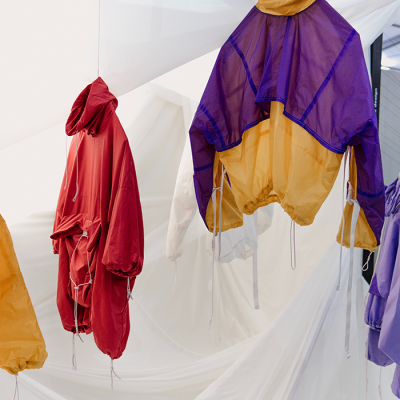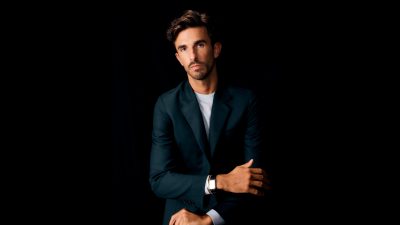THE FUTURE OF FASHION
We speak to mavericks in the fashion space about the future of the industry | May 03 2023

We speak to mavericks in the fashion space about the future of the industry | May 03 2023
At Made Thought, we believe that every meaningful solution begins with asking the right questions.
Fashion has always been the beating heart of creativity and culture. It’s an industry worth an estimated $1.84 billion dollars in 2022. If fashion was a country, it would be the world's tenth-largest economy.
But with this great power comes even greater challenges and responsibilities — issues which will continue to shape not just the way we look, but the very health of our planet and the people who live on it.
So what does the future of fashion hold?
We’ve found inspiration in a number of innovative companies — from a sustainable technology brand that produces washing machine filters to capture microplastics, to a collective creating new materials that return to earth as nutrients, not toxins. We are excited to see that the wheels of significant change are in motion.
In our new series we're seeking to broaden our knowledge further by asking global experts from across the industry for their thoughts on the burning issues of fashion today, tomorrow and far into the future. From diversity, to sustainability, to the metaverse, to future tech — their answers shine a light on where our thinking should be heading.
JOHN WILSON,
CEO AT UNIVERSAL DESIGN STUDIO AND MAP PROJECT OFFICE

Beginning his career in advertising, John went on to run marketing at Burberry, working alongside Riccardo Tisci, and has consulted with Matthew Williams of Givenchy and the late Virgil Abloh at Off-White. Today he runs Universal Design Studio, an architecture and interior design practice, and Map Project Office, an industrial and product design studio, working on projects for clients including IBM, Ace Hotel, Rimowa and L’Oreal.
What excites you about the future of the sector and why?
We are in a cycle of constant consumption and nowhere does this ring truer than in the fashion industry, it’s an impossible model for attempting to tackle sustainability. This has to be the greatest existential problem fashion faces — even as we look to reduce carbon footprints in specific parts of the chain, the industry as a whole will remain a net problem. Breakthrough innovation around circular production and radical solutions to recycling and refabricating are certainly taking us in the right direction. Could we recycle products at home and then use a personal 3D printer to reconstitute new designs? I’m excited to see where the really big thinking is coming from in this space. One of Universal’s most recent projects was H&M Looop, a garment-to-garment recycling space in the brand's Stockholm flagship that reworks old clothes into new designs. Though the process is currently slow and not yet-scalable, the ambitions here are rooted in learning and education — helping to uncover what could be possible in our near futures. Fashion should be taking more steps like this, there is an element of consumer education that could be happening now in lieu of the bigger milestone changes, helping to deepen our understanding of the full journey of our products and influencing our habits.
What worries you about the future of the sector and why?
Diversity, inclusion and representation are obviously a huge issue generally, but I think it’s particularly acute in the fashion industry. Why? Firstly, the soft barriers to entry for people from minority backgrounds and lower income families create a concentration of white wealthy people in the industry. We need to stop unpaid internships. We need to have non-tolerance to cultural obstacles. Secondly, fashion is hugely inspired and propelled by drawing from influences from black and ethnic culture. Appropriation without representation is not acceptable. Finally, image making in fashion plays a huge part in shaping, changing and reinforcing cultural norms — the industry has to accept more responsibility for positive change around representation of different ethnicities, (dis)ability, size, etc.
How do you envision the fashion industry in 5 years from today?
We're only at the beginning of a totally new category of digital clothing, accessories and fashion. A generation brought up with gaming as their dominant cultural milieu do not distinguish between physical and digital experience in nearly as marked a way as previous generations. It’s exciting to see where this space will go over the next 5 years. Much of this is wrapped up in the metaverse and digital accessories for digital avatars, but I am increasingly excited about adaptive interactive design being incorporated into physical garments and accessories.
How do you envision the fashion industry in 50 years from today?
An inevitable outcome of climate change is a radically changing and unpredictable climate. So there are going to be difficult and yet fascinating challenges and questions for the next 50 years. To what extent can we trust in our current concept of seasons? Will clothing need to be increasingly flexible, modular and adaptive so that we dress and be prepared for a day that may oscillate between extremes of rain, cold and heat? How will collections be structured going forward? What does this mean for the fashion calendar? And maybe most importantly, how will these clothes look?
Change is inevitable but will the fashion sector be able to achieve it alone or will external influences play a part?
I see technology driving a lot of transformation. Retail habits particularly in fashion are changing fast, and ecommerce is increasingly the dominant channel. But so much of the ecommerce experience has been optimised to the point of commoditisation. Every website looks the same. Every ecommerce interface looks the same. Everything is streamlined to drive conversion. But where is the surprise and delight that was fundamental to driving desirability and therefore the price premium luxury brands demand? Consumers will decide what works for them, but there is huge scope for creative talent inside the industry and beyond to shape what these experiences look like.
Is there a person or brand in the space you find inspiring at the moment?
I am and was hugely inspired by what Virgil was doing around inclusivity and diversity across the industry. I loved how he opened doors for others (who previously wouldn’t have been let in) and how in turn he changed how we see fashion today.
In light of our need to break the fashion cycle, companies that are already looking to reduce production cycles and on-demand making are crucial. I’m also a fan of Becky Okell and Huw Thomas who co-founded Paynter Jackets. Paytner recreates limited edition jackets, using the best materials they can find, with no waste. For me, this is a story of slow fashion, made with consideration and care and designed to last the test of time. They only have releases four times a year and they spend their time refining the product to lessen the impact with each batch. Made-to-order, recycled offcuts and a waiting list that absorbs any product returns — a nod to what the future of fashion could really look like.
TEO VAN DEN BROEKE,
EDITORIAL DIRECTOR AT SOHO HOUSE

Teo studied fine art before beginning an esteemed career in fashion journalism for publications including Wallpaper*, Esquire, GQ and the Financial Times. Today he is Editorial Director at Soho House, overseeing the group’s cultural output on fashion, art, interiors, music, film and more. His memoir ‘The Closet’, will be published in Spring 2023.
What excites you about the future of the sector and why?
I’m excited about meaningful sustainability in fashion. I like the idea that sustainability can be sexy and that new doesn’t always mean good.
What worries you about the future of the sector and why?
Too much newness for the sake of newness at the expense of the environment.
How do you envision the fashion industry in 5 years from today?
I think that in five years it will be impossible to be a brand which produces without adhering to a strict set of sustainability guidelines. My hope is that these guidelines will be implemented and maintained by governments, so they cannot be contravened. It will mean that prices and quality will be higher, but then we’ll buy better, buy less and love everything we buy more.
How do you envision the fashion industry in 50 years from today?
Let’s hope we still have a planet, let alone a fashion industry.
Change is inevitable but will the fashion sector be able to achieve it alone or will external influences play a part?
As I’ve mentioned in my previous comments, the governments of the world need to implement laws which prevent companies pursuing dangerous and harmful practices. It’s as simple as that. Until it happens, brands will continue doing environmentally destructive things in the pursuit of profit.
Is there a person or brand in the space you find inspiring at the moment?
There are a whole slew of young British designers which I think are changing the face of the fashion industry: Harris Reed, Bianca Saunders, Martine Rose, Maximillian Davis. All exciting, all energised, all excellent.
SHAWAY YEH,
FOUNDER OF YEHYEHYEH; GROUP STYLE EDITORIAL DIRECTOR AT MODERN MEDIA

Shaway Yeh began her career working with independent magazines in New York in the 1990s before becoming one of China’s most powerful editorial voices at Modern Media. Today she works as an advocate for sustainable fashion with institutions including the International Woolmark Prize, Copenhagen Fashion Summit and the Green Carpet Fashion award. Her consultancy yehyehyeh partners with brands who want to transition towards more sustainable practices.
What excites you about the future of the sector and why?
To be frank, I'm not so excited about it. Because I think the urgency of the whole global crisis — whether environmental, political or economic — has become so much more prominent. The more prominent it becomes, the more I feel the fashion industry is not really helping. Of course it’s a huge industry, a lot of people are working there, and they are trying to contribute with their own responsibilities as citizens, or as people in this industry. But the systemic issues are major. Maybe the exciting thing is the fact that there is a possibility for change?
What worries you about the future of the sector and why?
The worrying thing is that we’re not doing enough right now. I think the biggest problem right now is still the business model. People are still producing a lot, which is creating a lot of waste. We talk about the circular economy, and it's good to have this awareness. But then, first of all, the technology is still very nascent, so it's hard to be applied at a larger scale.
Second of all, I don't know how many brands or companies really sincerely care about this, because I think they still care about their profit, the gross margins. Right now not I don't think anyone is saying ‘I want to produce less and make less money’. So they're looking for alternative models. But the alternative model, whether it’s sharing or re-commerce or whatever, it seems like that it’s just designed to generate extra revenue.
Thankfully there’s a younger generation of designers who want to do things differently. But the overall picture of the system is that I don't really see changes. In a nutshell — the fashion industry currently produces a lot of things which people don't need.
How do you envision the fashion industry in 5 years from today?
More and more people are talking about virtual wardrobes, especially with the consumer becoming younger. But is that going to help not buying any physical clothes? I'm not quite sure. Do you just end up owning a lot of physical clothes and a lot of virtual clothes? So I think that might be one of the alternatives, if not a solution. And we don't need to wait 50 years for this, this will be more like 5 years. I do think that we'll have changes in the next few years from governments and organisations that will require companies to become much more responsible.
And also pressures from the consumer side, because they're increasingly aware about the whole crisis. So I'm sure the industry will have to change. But my point is, can it change enough? By 2030, a lot of companies are saying they're going to be using 50% or 80% recycled material, and so forth. Well, I think it's great, it's better than wasting virgin materials. But if a thing has no value at all to begin with, why even spend more energy and time to recycle it?
How do you envision the fashion industry in 50 years from today?
I think we might not need to wear ‘clothes’ as we think of them today. Because a lot of functions can probably be implanted within the body. So you might have something which you can adjust at will to different temperatures or protective levels or colours or patterns or images. So maybe we won't need this material or this kind of shell called ‘clothes’.
Change is inevitable but will the fashion sector be able to achieve it alone or will external influences play a part?
I think it will become more and more collaborative, because we need to solve a lot of problems like the waste problem, or new material problems, or even biodiversity problems. So you need to work together with scientists, farmers, artisans, chemists etc. And then government bodies and NGOs will be influencing decisions. And the consumer will probably be more and more participatory. We need to find people from across different backgrounds who can collaborate and provide the solutions to create change.
Is there a person or brand in the space you find inspiring at the moment?
Well, I think that's kind of hard to answer! I’m currently in the process of judging the Woolmark prize, and there are a lot of young people there who I think are really inspiring. More widely, most people in my field respect brands like Patagonia, especially as the founder Yvon Chouinard recently announced he is going to focus all the profits on environmental protection. And I like what Pangaia is doing — they act more like a material science company than a fashion brand. It's an interesting model because they’re sharing their learning and partnering with others to bring new technology to the market.